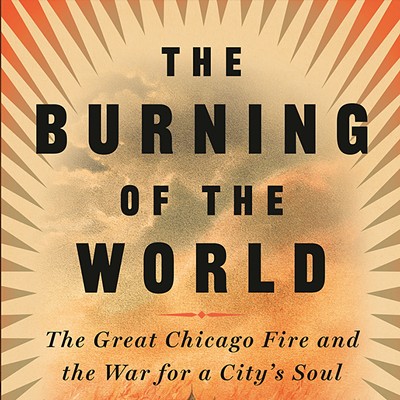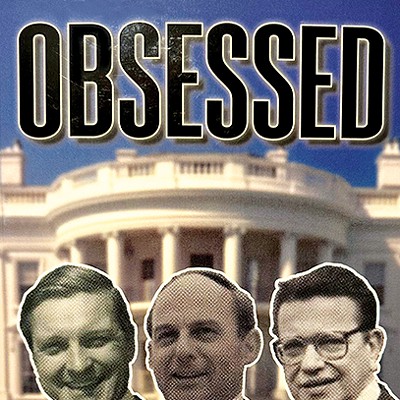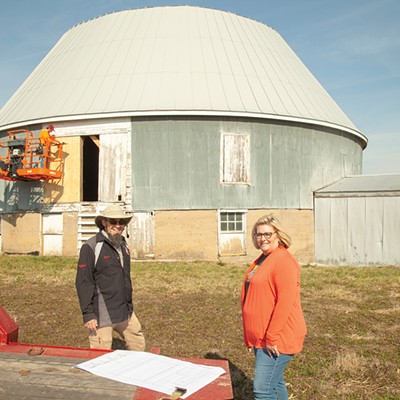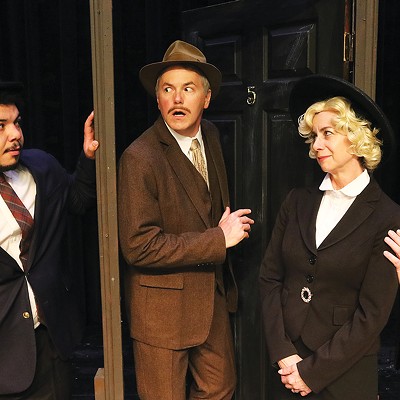Ralls Melotte is known for his work in art glass and architecture. A registered architect for over 50 years, he was a partner in the Springfield architectural firm Melotte, Morse, Leonatti, Parker, Ltd. In 2019 he retired, moved to Wisconsin, and has now added to his repertoire by writing his first novel, Cat's Café, the first in a planned trilogy. Melotte says, "I've always enjoyed writing, but publishing and marketing are all new to me."
Melotte's interests have included geology, geography and railroads. On a trip to visit his wife's family in Idaho, he learned more about his interests and was inspired. "I learned of the unique volcanic explosions that shaped the land and then about the canal systems that helped develop rich farmland," he says. "It was our third stop in Idaho Falls where I found out about the history of Eagle Rock. These all influenced me to write this novel."
Don't be fooled into thinking Cat's Café is a typical western, even though some items sound familiar: a tough sheriff, a corrupt politician, a ruthless gang, a sexy bar waitress, a disreputable financier, an ignored Indian, an abandoned woman, all living in a rough-and-tumble outpost where the saloon draws unruly men. The novel is much more, as Melotte has used real people and real events to weave together a story that focuses on the strength of settlers, the development of towns in the 1870s, and the independence of women.
"I found as much satisfaction discovering first-person records, maps and blogs by writers with a shared passion for the Old West, as I did creating a realistic story to weave into actual events," says the author.
The novel begins on July 3, 1879, with Catherine (Cat) opening up the saloon that she and her husband, Patrick, own. As she slings steins of beer and calms the carousing men, she wonders where her husband is. She waits for Patrick to come home, but days drag into weeks, and she knows her survival depends on keeping the saloon running. She has always wanted a café, not just a saloon, and gains the help of Jay, along with his mother, Crow Feather, who makes the most delicious meals. Cat begins to offer breakfasts and lunches to the folks of Eagle Rock, Idaho, who are starving for a decent meal instead of the slop served at the hotel. Suddenly, Cat's Café has lines waiting for tables for both breakfast and lunch. Cat is catapulted into running a business, ordering supplies, hiring workers, dealing with difficult clients and making friends with many in town, including Fannie, who works the bar, and Henry, who interests Cat.
Word arrives that her husband has been found, drowned in the Snake River. What Cat doesn't know is that the Mormon mayor, Luther Armstrong, is behind Patrick's disappearance. His motives become clear and, as the plot develops, others appear to be less than innocent, including Sheriff Zane Gunther. A few twists and surprises show that others are embroiled in some dirty dealing behind the scenes.
Melotte has done extensive research to weave into the plot the real-life story of the expansion of the railroad, the founding of Eagle Rock, the influence of the Mormons, and the work of actual people who settled in the area. Melotte has used real people for characters such as Robert Anderson and Matt Taylor who built the first bridge across Snake River.
The author also includes Herman Berghoff. "Berghoff was from Germany and came to the West to be a cowboy," Melotte says. "He introduced a way to cool beer, which tasted better than the beer that was served warm and was bitter. Years later the Berghoff Restaurant in Chicago became famous."
Two other real-life characters are Rebecca Mitchell, a missionary from Illinois, who set up a school and promoted women's rights, and Francis Dubois, from Springfield, who became the U.S. Marshall in Idaho. Melotte says his book combines Illinois history with Idaho history.
Chapter explanations in the appendix are as interesting as the novel itself and provide the historical background of such events as the 1857 Mountain Massacre, the financing of railroads by tycoon Jay Gould, the influx of Mormons to the area, as well as information about the Snake River, whiskey, train schedules, the use of the telegraph, and the history of the Pony Express.
The development of the railroad, the support for women's rights, the strength of people, and the changes needed to form a town are areas Melotte explores in his novel. "I wanted to show that there was huge enterprise in the West," Melotte says. "Many went west to escape trouble, but many also wanted to take risks, start over, and be part of a new territory."
Melotte, too, has taken a risk and started over by writing a novel.
With rich descriptions of the land, history of the region, realistic dialogue that Melotte researched, and well-developed characters, Cat's Café is an interesting and fun read which includes a love story, a murder mystery, a twist, and a hanging ending.
Melotte has already begun the second novel in his Eagle Rock Trilogy. Cat's Cafe is available at rallsmelotte.com.
Cinda Ackerman Klickna writes book reviews and enjoyed the history and real characters that are woven into the plot of the novel.























